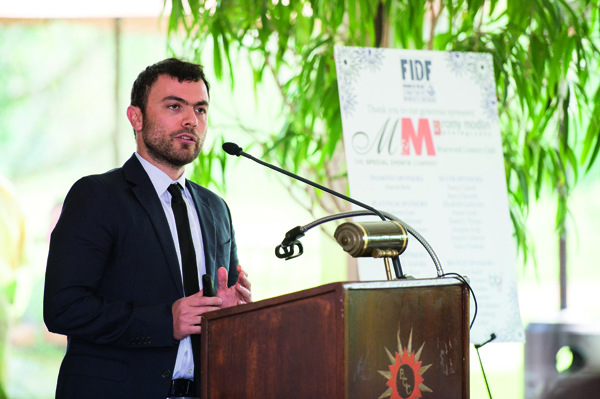



Noam Gershony, like most Israeli young women and men, served in the Israel Defense Forces. He was a helicopter pilot. At the age of 23, during the second Lebanon War in 2006, his Apache helicopter crashed with a second Apache during a border area maneuver. Doctors did not expect him to live: the co-pilot did not survive.
In an interview with The Jewish Link during his east coast Friends of the Israel Defense Forces (FIDF) campaign, Gershony described the extent of his injuries. He listed broken and crushed legs and arms, pelvic fractures, vertebral fractures, rib fractures, an elbow fracture, a fractured shoulder and a fractured jaw, and didn’t even mention the extensive internal injuries that he surely must have sustained. He defied the odds and was released from inpatient rehab care after six months, continuing as an outpatient every day for another year.
The Times of Israel described him as “the gold medalist who came back from the dead.”
Gershony is twice a national hero, first as a dedicated and courageous IDF soldier, and again as the first Israeli to achieve a gold medal in the Paralympics quad (for quadriplegic) tennis competition. That was in 2012 in London, following the conclusion of the traditional Olympic games. Gershony said that he did play tennis before his injuries, but became serious about it during the rehabilitation process.
Gershony said he never aspired to Paralympic competition, but as he improved and won tournaments, he realized he could qualify for the team. He continues to train with the inspirational Israeli national team, and wants to help train others. In addition, he volunteers teaching math to underprivileged Israeli children. He also gives motivational talks, and believes that life is always what you make of it.
“Bad things happen, and we have a choice on how we grasp that reality. We create our own perspective on life,” Gershony explained.
He is particularly sensitive to the needs of the IDF soldiers, who put their lives on hold—and on the line—for three years. He is also focused on the IDF soldiers’ lives after the army—whether healthy or injured. They invariably have special needs following discharge; some are loners, some have no family and many experience a multitude of other life challenges. The Israeli government is not appropriately funded to provide for all those important needs.
That is when Friends of the IDF steps in. The FIDF fill in the gaps for which the Israeli government cannot provide. Many soldiers need extended medical and psychological services. Many cannot afford the type of prosthetic limbs that could make a difference in their quality of life or their ability to be a self-sustaining business owner or employee. Many are unemployed. Others are wounded and permanently disabled. There are also the families of fallen soldiers to help; their practical needs are great, in addition to their agonizing grief at the loss of their loved one.
Gershony feels a great sense of responsibility, appreciation and pride as he supports the important programs and services of the FIDF. He considers it “an honor and a privilege” to travel with the organization that helps so many Israeli soldiers and former soldiers.
In the video of the medal ceremony at the 2012 Paralympic games, Gershony is shown dissolving into tears during the playing of Hatikvah as the Israeli flag is raised. The JLNJ asked Gershony what was going through his mind during those tearful moments, as a gold medal was draped across the front of his team uniform. He described a convergence of thoughts and emotions that washed over him—his appreciation for all that soldiers do and for his family and friends in the stands, and the honor that this achievement brought to Israel.
For more information or to make a contribution, visit www.fidf.org.
By Ellie Wolf










